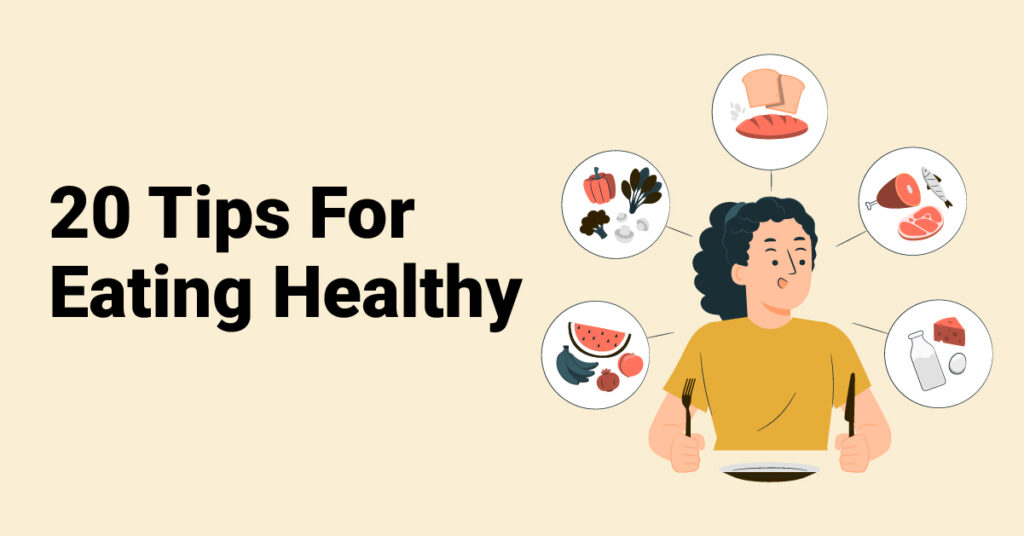Following a healthy diet isn’t always that easy. There are a lot of important things to take into consideration in order to live a healthy lifestyle. Having said that, there are also a lot of simple changes we can make to eat healthily.
For example, choosing fermented, sprouted whole grains over refined grains and eating more protein and high-quality fats (such as olive oil, avocado oil, and grass-fed tallow). You may or may not already know that the key to a healthy diet is to eat the right amount of calories for how active you are, drink more than your body needs, and eat a wide range of nutritious foods to make sure you’re getting a well-balanced diet.

However, making changes to your diet, no matter how small, can be quite overwhelming. With that in mind, it’s best to start with more manageable changes that will still make a difference.
I want to cover 20 tips for eating healthy, which are things I’ve picked up along the way during my own health journey. These tips will help you make small, incremental changes, which will in turn let you lead a sustainable healthier lifestyle.
1. Be Picky About The Fat You Eat
There is a lot of confusion about the role of saturated fats in our diet. For a long time we’ve been told to stay away from this “bad” fat, which is usually found in animal products like pork, beef, and fatty dairy foods such as cream and cheese. We have heard that too much saturated fat can increase cholesterol levels in your blood as it can increase the risk of developing heart disease.
But, a large scale meta-analysis found no association between saturated fat consumption and death by any cause, and some small trials even found it to be protective to cardiovascular and metabolic health.
What does this mean? That “staying away from saturated fat” is not a one-size-fits-all solution. Instead, you want to be picky about the fat you eat while being aware of the role healthy fats play in your diet.
If you consume a meal that is a lot of processed carbs (think pizza, pasta, etc.) your body will make more insulin than if you eat the exact same amount of carbs from unprocessed food (think roasted sweet potatoes).
In general, the saturated fats to stay away from are :
- Seed oils (vegetable oil, canola oil, sunflower oil, cottonseed oil, etc.)
- Shelf-stable, highly processed foods with ingredients your great-grandmother wouldn’t know
- Margarine
- Butter
- Pastries and sweet stuff
- Foods fried in seed oils
Good saturated fats when combined with eating whole, non-processed foods:
- Grass-fed ghee (clarified butter)
- Grass-fed butter (in moderation)
- Oily fish
- Avocado oil
- Olive oil
- Tallow (grass-fed beef fat)
- Lard (grass-fed pork fat)
- Avocado
2. Eat Less Sugar
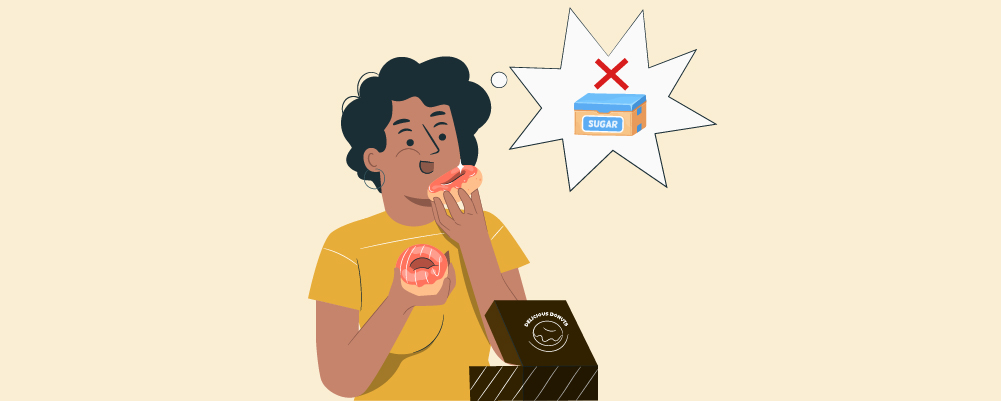
Consuming too much sugar on a regular basis massively increases your risk of tooth decay and obesity. It is now widely believed that foods and drinks that contain high levels of sugar content can cause fatigue. If consumed too often, this can also lead to weight gain.
The type of sugar you should look to cut down on if you want to eat more healthily is added sugar. Added sugars are any type of sugar added to a food or drink. They don’t include natural sugars that are found in foods like honey, real maple syrup, and fruit.
Most packaged foods and drinks contain a high level of added sugars so simply steering clearing will reduce your intake. I recommend cutting down on added sugar before the sugars found in milk and fruit as these are better for you.
Examples of foods that contain added sugars are:
- Pastries
- Desserts
- Sweets
- Chocolate
- Alcohol
- Soft drinks
- Cookies
The best way to identify how much sugar a food or drink item contains is to read the food label. This will tell you exactly how much sugar something contains. If it has “added sugar” listed, stay away. And look at the ingredients. Often added sugars are hidden so it’s important to recognize the different names for sugars—one hint is that many types of sugar end in -ose.
3. Eat Less Table Salt And More Mineral Salt
According to Health.gov, 9 out of 10 Americans eat more sodium than they need. But more and more evidence is showing that it’s not sodium that is the problem, but sugar.
Dr. James DiNicolantonio, author of The Salt Fix: Why the Experts Got It All Wrong—and How Eating More Might Save Your Life, is a research scientist for Saint Luke’s Mid America Heart Institute in Kansas City, Missouri. He is challenging the norm when it comes to salt and health, publishing more than 200 papers on nutrition and how it relates to cardiovascular health.
He has found that sodium is crucial to many human biological functions and one of the most important is the transportation and absorption of vitamin C into the brain, our bones, and the intestinal tract. He hypothesizes that most Americans are in a salt deficit. The problem, he says, is not how much salt we consume, but how much sugar we consume as sugar disrupts how salt is absorbed by our bodies.
This is called hyponatremia, a condition caused by abnormally low sodium levels in the blood.
When we cut down on how much sugar we eat, we will find ourselves with the ability to now ingest salt properly. He recommends not to use table salt, as it is devoid of the critical minerals salt naturally provides, but unrefined mineral salt.
I use both Redmond Salt (from Utah) and Celtic Sea Salt and recommend them both.
4. Eat Fish, Including Oily Fish
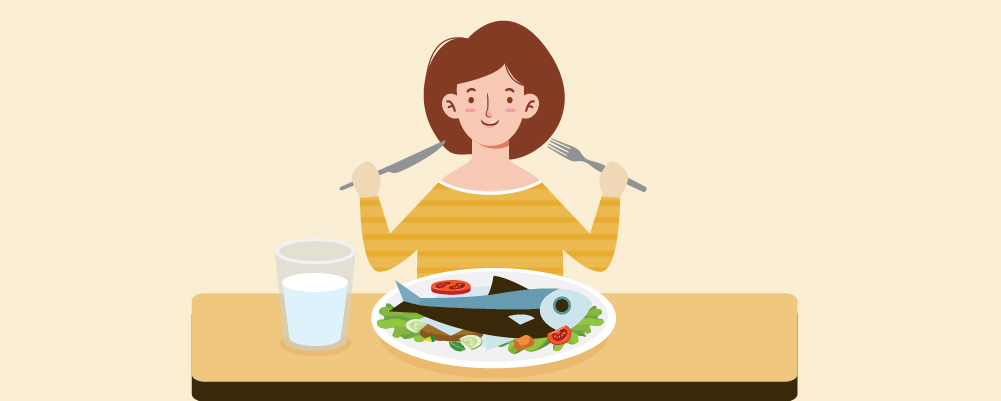
A great way to improve your diet and improve your health is to eat more fish, in particular oily fish. Oily fish is packed with healthy Omega-3 fatty acids that are good for us in more ways than one.
However, the biggest benefit of consuming more Omega-3 fatty acids would have to be how they benefit the heart. Omega-3 fatty acids benefit the heart by decreasing triglycerides, reducing the risks of blood clotting, lowering blood pressure, decreasing the chance of heart disease, and reducing irregular heartbeats.
All it takes to make a positive change to your diet in relation to eating oily fish is the inclusion of two servings of fish a week. It is believed that this amount of fish will dramatically improve your heart health over time.
For those of you that aren’t sure what Omega-3 fatty acids are, let me explain. Omega-3 fatty acids are a type of unsaturated fatty acid that helps reduce inflammation throughout our bodies.
Some of the most common types of fish we eat are high in Omega-3 fatty acids. This includes salmon, cod, herring, tuna, and trout.
5. Include High Fiber Foods
The next tip I have for you is to include higher-fiber foods in your diet. Higher fiber foods should account for more than one-third of the food you eat on a daily basis. This can include bread, potatoes, cereals, pasta, and rice.
A type of carbohydrate, fiber helps regulate your body’s use of sugars. This helps keep hunger at bay and control blood sugar. Choosing higher-fiber foods such as dark, leafy vegetables or whole grain varieties is an easy way to introduce more fiber into your diet.
Examples of whole grain varieties include brown rice, potatoes with the skin on, and whole wheat pasta. This type of fiber contains more fiber than refined or white starchy carbohydrates. Therefore, you’ll feel fuller for longer.
As you would expect, this will help you eat less in a day, burn more calories, and lose weight. You should aim to include at least 1 piece of starchy food with every meal you eat. Some people believe that starchy food is fattening but it actually provides fewer than half the number of calories fat does.
6. Switch From Basic To Complex Carbs
While there might not be anything wrong with eating basic carbohydrates, switching to complex carbs is much more beneficial for those of you that want to eat healthier and lose more weight.
Compared to basic carbohydrates, complex carbs take longer to digest. They are also a more stable source of energy. As a result, they make us feel fuller for longer and provide us with more energy to keep going without more food.
This makes it easier for us to cut down on how much food we eat, whilst still feeling energized. Types of foods in which complex carbohydrates are present include vegetables, fruit, nuts, legumes, and whole grains.
Basic carbohydrates can be found in foods like candy, table sugar, fruit juice concentrate, and sugary drinks. These will leave us feeling hungry again very quickly. Of course, we’ll also be searching for more energy sooner than when we eat complex carbohydrates.
7. Eat Lots Of Fruit And Vegetables Daily
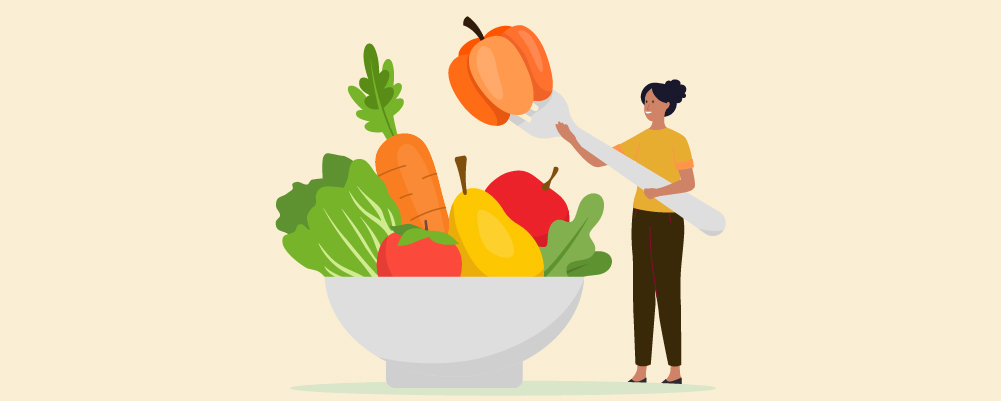
Eating fruit and vegetables every day is something we’ve all been told to do from a very young age. In fact, eating more fruit and vegetables is one of the easiest ways people can introduce healthier foods to their diet.
However, it will probably come as a surprise to you that 90% of Americans don’t eat enough fruit and vegetables. If you help make up that number, you have to add more fruit and vegetables to your diet.
It’s recommended that we should eat at least 5 portions of fruits and vegetables every single day. It doesn’t matter if they’re fresh, canned, dried, or frozen as long as you fit them in.
Commonly referred to as 5 A Day, this isn’t always the easiest thing to do, but the benefits are huge. Fruits and vegetables are loaded with essential nutrients, vitamins, and antioxidants that promote good health.
To add more fruit and vegetables to your diet, try adding a banana to your breakfast, slice a tomato to go along with a meal, or roast sweet potato and broccoli to enjoy with high-quality protein (it’s one of my favorite easy side-dishes! just add some olive oil, thyme, salt, and pepper and roast until it’s slightly browned).
8. Be Active A Few More Times A Week
Eating healthy isn’t the only way you can keep your body in good shape. Regular exercise helps a lot too. In fact, like eating healthy, regular exercise can make a massive difference to your overall health and well-being both mentally and physically.
For starters, daily exercise can reduce your risk of experiencing serious health issues. Being overweight can lead to health conditions like diabetes, cancer, strokes, and heart disease. Therefore, staying fit and reducing your weight can reduce the risks of any problems.
Combining a healthier balanced diet with more exercise is one of the best ways to lose weight. Eating the right amount of food every day will also help you keep the weight off. Being more active can also improve your mental health.
Regular exercise comes with a host of mental health benefits that can improve your focus, attention, and determination. (And did you know that regular exercise has now been shown to have the same benefits as taking an antidepressant?)
These benefits might be all you need to spur you on to do more and stick to a healthy diet.
9. Keep Hydrated
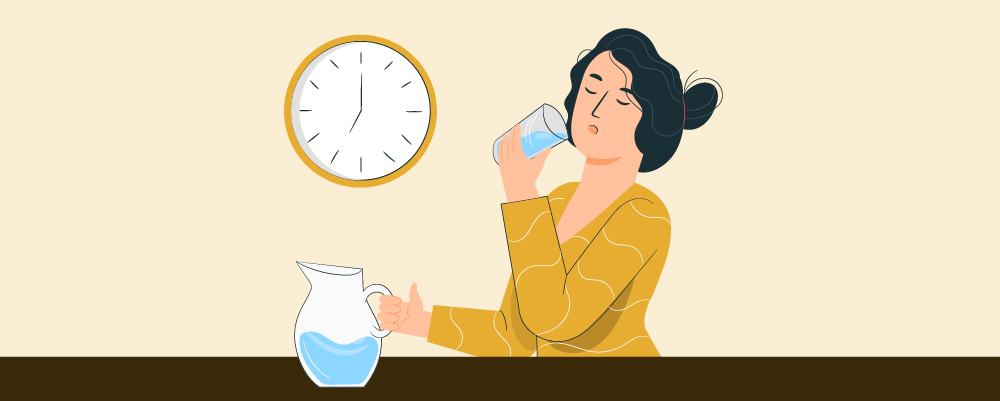
We can’t stress enough how important it is to stay hydrated and not get thirsty. You have to drink fluids throughout the day to stay hydrated. If you don’t, your body will feel fatigued, drained, and nauseous. There are also more serious consequences linked to dehydration like seizures, kidney failure, and even death.
Don’t worry though, these consequences are very rare, so as long as you stay hydrated you’ll be fine. The government guidelines advise that people should drink 6 to 8 glasses of healthy fluids every day.
Any non-alcoholic beverage counts but low-fat milk, tea, coffee, water, and low-sugar drinks are by far your best option. These drinks are the healthiest drinks you can choose. Drinks you should try to avoid when it comes to staying hydrated include sugary soft drinks. These drinks are calorific and bad for your teeth.
You might also want to avoid fruit juice as it can contain high levels of added sugar. You should also remember to drink more on hot days or when exercising.
10. Stop Drinking Soda, Even Diet Soda
Despite being a hugely popular beverage all over the world, there is great debate as to whether or not soda is good or bad for us. There is even debate when it comes to diet soda, with some people believing it’s okay to drink while others avoid it at all costs (which blows my mind, as if you read the ingredients in any diet soft drink, it’s easy to see it’s NOT good for you!).
If you want to eat healthily, I recommend staying away from any type of soda, even diet soda. Despite being free from sugar and calories, diet soda contains artificial sweeteners like aspartame and cyclamates.
These artificial sweeteners are associated with an increased risk of metabolic syndrome and obesity. Therefore, despite containing no calories, diet soda doesn’t actually promote weight loss. You’d be much better off drinking water or low-sugar drinks such as unsweetened black tea.
As you can imagine, the same can be said about soda. Soda simply isn’t good for a person’s health. You can drink it in moderation but drinking too much soda regularly can lead to weight gain, cardiovascular conditions, and diabetes.
12. Try Intermittent Fasting
Intermittent Fasting (or IF) is based on the idea that your body needs a break from digesting food. The goal is to go for extended periods of time without any food. This is then followed by a period of eating normally again.
This can lead to you eating fewer calories than you normally would, which helps promote weight loss. It is also believed that intermittent fasting comes with similar benefits to other diets.
This includes reduced risk of strokes, improved gut health, better sleep, and reduced cardiovascular risk factors. However, it is also worth noting that intermittent fasting can come with some side effects. These can include hunger, fatigue, nausea, and headaches.
As a result, intermittent fasting isn’t for everyone. With that in mind, if it doesn’t work for you, don’t force it to. A popular intermittent fasting plan you can try is the 5:2 diet. To follow this diet, you have to eat 500 to 600 calories two days a week. On other days, you eat normally.
Another common way to practice intermittent fasting is to have a “feeding window” where you consume most of your calories. For example: You can eat between 11am and 6pm, which gives you a 7-hour feeding window.
You can also do one-meal-a-day (OMAD) where you consume all your calories for the day in a 1 to 2-hour timeframe.
12. Eat Whole Grains
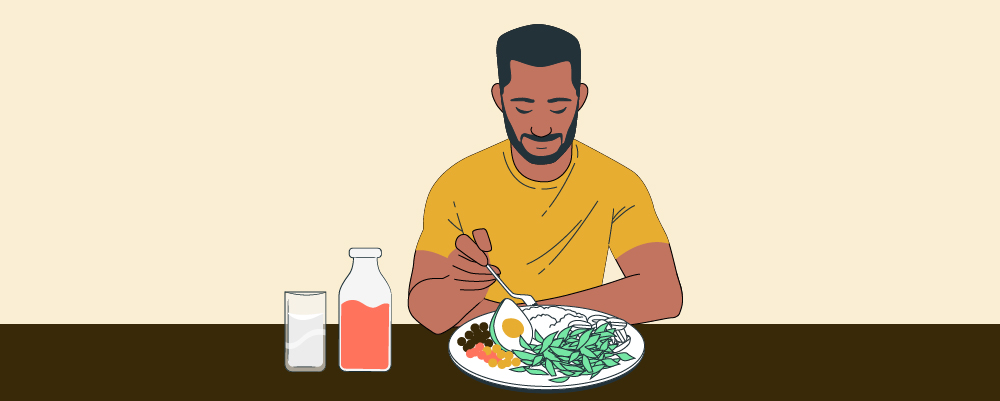
Any food made from rice, wheat, oats, barley, and cornmeal is a grain product. Grains are split into two main categories. Those categories are whole grains and refined grains.
For a healthier diet, whole grains are a much better option because they contain more fiber, vitamins, and minerals. People who eat whole grains regularly have a reduced risk of experiencing various chronic diseases. Other whole grain benefits include reduced risk of heart disease, reduced risk of strokes, increased intake of vitamins, minerals, and fiber, increased weight loss, and improved digestion.
In terms of how many whole grains you should eat, experts recommend eating 5 to 8 ounces of grains per day. But this high-amount is starting to be questioned. Whole grain foods are delicious and a great way to add nutrients to your diet, but prioritize healthy proteins and fats before eating grains.
Some other whole-grain foods you could eat include whole-grain corn, quinoa, popcorn, brown rice, and whole oats.
13. Brown vs White Grains
There are differences between brown and white grains. Take rice for example. Brown rice is a healthy whole grain whilst white rice is a refined grain that’s had parts of the grain removed. Whilst both grains are quite similar, there are some differences when it comes to nutritional value.
Whole grains like brown rice contain all of the grain, including the fibrous bran, nutritious germ, and carb-rich endosperm. White grain has the bran and germ removed which are the most nutritious parts. As a result, white grains usually contain fewer essential nutrients.
Key nutrients you will find in brown whole grains and not in white refined grains include vitamins and minerals like vitamin B6, iron, and zinc. The addition of more nutrients and minerals makes brown grains more worthwhile to eat.
Unlike white grains, brown grains have a more positive impact on blood sugar levels. They also offer valuable benefits in terms of reducing heart disease risk. Having said that, white grains do have some advantages too.
For example, white grains are softer to eat, quicker to cook and free from arsenic.
14. When You Eat, Slow Down!
It may sound strange but there is actually a lot of evidence that suggests eating slowly may actually fill us up faster. Research has shown that the pace at which we eat influences how much we eat and how likely we are to gain weight.
Studies have revealed that fast eaters are more likely to have a higher body mass index and eat more than slow eaters. Bearing that in mind, it’s worth slowing down when you eat. The reason for this is related to the hormones that control our appetite.
How much we eat and when we get full is controlled by hormones. These hormones send signals to our brains to tell us whether we’re still hungry or full. However, it takes approximately 20 minutes for the signals to reach the brain. Therefore, eating more slowly gives our brains more time to perceive how full we are.
If you slow down how fast you eat, you can expect to see a reduction in the number of calories you eat on a daily basis. You’ll find that your body doesn’t need to consume as much.
15. Try Greek Yogurt
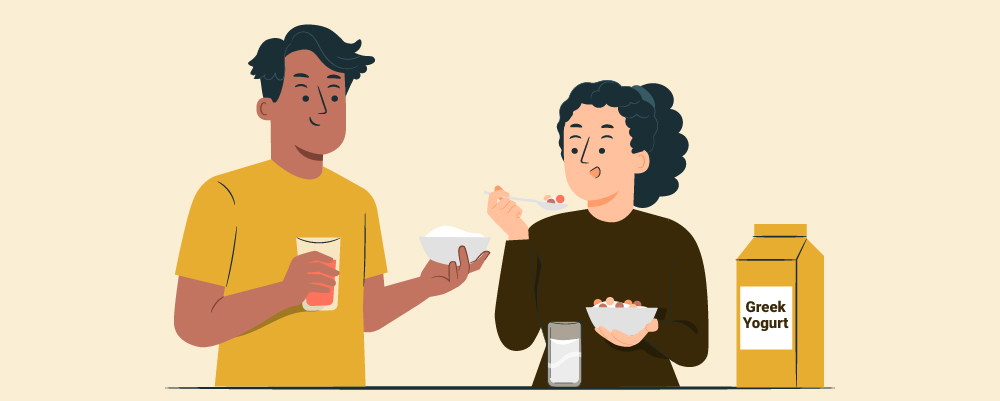
One interesting tip I can give you is to try adding Greek yogurt to your diet. Greek yogurt or Greek-style yogurt is much creamier and thicker than standard yogurt. This is because the yogurt has been strained to remove any excess whey.
The end result is a yogurt that’s much higher in protein and fat than regular yogurt. Why is this important we hear you ask? Well, because Greek yogurt is a better source of protein. In fact, Greek yogurt can contain almost double the amount of protein as standard yogurt.
Aside from the obvious health benefits linked to eating more protein, protein can make you feel fuller for longer. This is great if you need to control your appetite and lose weight. Because Greek yogurt has been strained, it also contains fewer carbs and lactose.
This makes it an even better option for anyone following a low-carb diet. You can easily incorporate Greek yogurt into your diet by replacing snacks and regular yogurt with Greek yogurt.
16. Shop With A List, And Stick To It!
Making a nutritious grocery list and sticking to it will help you stick to a healthy diet. Walking around the shop throwing in anything you like to eat is great if you have good self-control. However, if you’re like most people, you’ll find it too easy to fill your basket with unhealthy foods.
There are two strategies you should employ when buying your weekly or monthly shop. Those strategies are making a shopping list in advance and sticking to it. A third strategy could be to make sure you don’t go to the shop hungry.
Knowing exactly what you need reduces, if not completely eliminates the chances of you making any impulse purchases. By sticking to your list, not only will you avoid bad foods but you’ll also buy healthier items to keep around the house.
Planning your shopping list in advance can also help you save money. As far as hunger is concerned, I recommend having a healthy snack before you go to the shops to prevent any unhealthy cravings.
17. Try Eggs With Breakfast
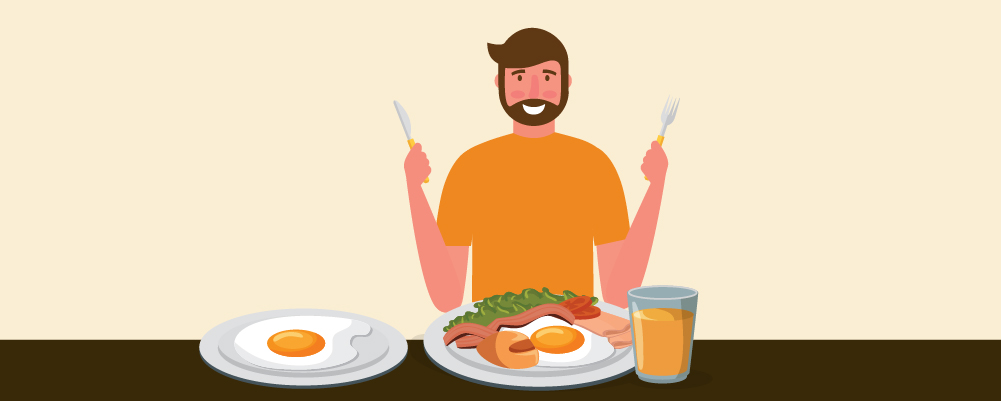
One of the best foods you can add to your diet if you want to eat more healthily is eggs. Eggs are an incredibly healthy food and a great source of healthy proteins. Eggs are also jam-packed with essential nutrients that most people don’t get in their diets.
One example of an essential nutrient you can get from eggs is choline. Choline is an essential nutrient that plays a key part in metabolism, so getting this from eggs is super useful.
If you want to add eggs to your diet, you should try to do so with your breakfast. Studies into different calorie-matched breakfasts have shown that eggs usually come out on top. Eating eggs in the morning has been shown to increase the feeling of fullness.
As a result, people that eat eggs with their breakfast often don’t consume as many calories throughout the day. This can be handy for those of you that want to lose weight. Simply replacing your breakfast cereal with eggs can improve your health dramatically, while also helping you lose weight.
18. Home Cooking vs Restaurants
Cooking at home is proven to be healthier than buying pre-prepared or restaurant food. Therefore, you should try to make a habit of cooking at home whenever you can. Of course, there’s absolutely nothing wrong with ordering in, eating out, or treating yourself to a frozen dinner but cooking at home is far more beneficial.
For starters, cooking at home saves you money as you don’t have to spend as much money to buy fresh and healthy ingredients. Secondly, when you cook for yourself, you know exactly what’s going into your food.
Aside from making it easier to eat healthy food, this also makes it much easier for you to count calories. Home cooked meals usually contain fewer calories in general anyway. Finally, by cooking in bulk, you can save leftovers for another time.
This reduces the chances of you ordering in or buying a shelf-stable dinner when you’re in a rush. Research has also proven that home cooking is linked to healthy eating, reduced risk of obesity, and improved diet quality.
19. Fresh vs Processed
Have you ever wondered why you should eat fresh food? The answer’s pretty simple! In comparison to processed foods, fresh and unprocessed foods contain a wide range of essential nutrients and vitamins we need to stay healthy.
They’re also free from preservatives and additives that can do serious harm to our bodies when consumed in large quantities. This includes diabetes, obesity, heart disease, and liver disease.
Fresh food is also a rich source of healthy fats and antioxidants. Both of these things promote a healthy heart. On the flip side, processed foods contain a lot of unhealthy ingredients such as saturated fats and sugar. Most processed foods also contain high levels of salt.
Aside from increasing the risks of various health issues, processed foods usually contain high numbers of calories. Whilst fresh food promotes good health and weight loss, processed foods do the opposite.
It’s probably also worth noting that fresh foods contain a higher quantity of fiber, which aids digestive function and metabolic health. I’ve listed examples of fresh foods below!
- Beans
- Flaxseeds
- Legumes
- Blackberries
- Avocados
- Kale
- Broccoli
- Sweet potatoes.
20. Take It Slow! Baby Steps!
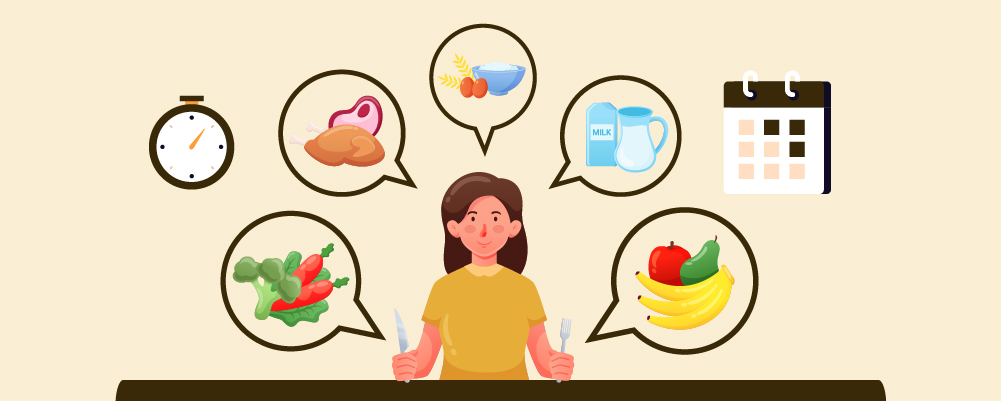
If you take just one thing away from this article, I want you to remember that it’s a marathon, not a sprint. Eating more healthily, losing weight, and improving your overall health isn’t going to happen overnight.
On top of that, not everything I’ve looked at will work for you. Part of the process when trying to attain a healthier lifestyle is finding the right diet strategies for you. Not every diet strategy works for everyone. You might find that something that works for one person doesn’t do anything for you.
It’s all about finding the right balance and trial and error. Instead of implementing as many strategies as you can, as soon as possible, you should instead try different strategies to see what works and what doesn’t.
That way, you can come up with a healthy eating plan that best suits your body and goals. Never get disheartened if something doesn’t work because there’s always something else you can try.
Summary
Completely overhauling your current diet plan can be a recipe for disaster. However, by incorporating small changes here and there and by altering the way we eat, you can make your diet much healthier.
Some of the tips I’ve looked at will help you improve your eating habits through small changes, whilst others will see you make huge differences in the foods you eat and how you eat them.
Some tips will get you to introduce healthier foods and nutrients to your diet, whilst others will implement simple strategies that promote a healthier lifestyle. Together, most of the tips in this article will help you improve your overall diet and health, so why don’t you implement some changes and see what happens?

